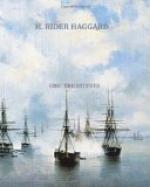“Men may win one good thing, and that is fame, Eric.”
“Nay, Gudruda, what is it to win fame? Is it not to raise up foes, as it were, from the very soil, who, made with secret hate, seek to stab us in the back? Is it not to lose peace, and toil on from height to height only to be hurled down at last? Happy, then, is the man whom fame flies from, for hers is a deadly gift.”
“Yet there is one thing left that thou hast not numbered, Eric, and it is love—for love is to our life what the sun is to the world, and, though it seems to set in death, yet it may rise again. We are happy, then, in our love, for there are many who live their lives and do not find it.”
So these two, Eric Brighteyes and Gudruda the Fair, talked sadly, for their hearts were heavy, and on them lay the shadow of sorrows that were to come.
“Say, sweet,” said Eric at length, “wilt thou that I go not into banishment? Then I must fall into outlawry, and my life will be in the hands of him who may take it; yet I think that my foes will find it hard to come by while my strength remains, and at the worst I do but turn to meet the fate that dogs me.”
“Nay, that I will not suffer, Brighteyes. Now we will go to my father, and he shall give thee his dragon of war—she is a good vessel—and thou shalt man her with the briskest men of our quarter: for there are many who will be glad to fare abroad with thee, Eric. Soon she shall be bound and thou shalt sail at once, Eric: for the sooner thou art gone the sooner the three years will be sped, and thou shalt come back to me. But, oh! that I might go with thee.”
Now Gudruda and Eric went to Asmund and spoke of this matter.
“I desired,” he answered, “that thou, Eric, shouldst bide here in Iceland till after harvest, for it is then that I would take Unna, Thorod’s daughter, to wife, and it was meet that thou shouldst sit at the wedding-feast and give her to me.”
“Nay, father, let Eric go,” said Gudruda, “for well begun is, surely, half done. He must remain three years in outlawry: add thou no day to them, for, if he stays here for long, I know this: that I shall find no heart to let him go, and, if go he must, then I shall go with him.”
“That may never be,” said Asmund; “thou art too young and fair to sail a-viking down the sea-path. Hearken, Eric: I give thee the good ship, and now we will go about to find stout men to man her.”
“That is a good gift,” said Eric; and afterwards they rode to the seashore and overhauled the vessel as she lay in her shed. She was a great dragon of war, long and slender, and standing high at stem and prow. She was fashioned of oak, all bolted together with iron, and at her prow was a gilded dragon most wonderfully carved.
Eric looked on her and his eyes brightened.
“Here rests a wave-horse that shall bear a viking well,” he said.
“Ay,” answered Asmund, “of all the things I own this ship is the very best. She is so swift that none may catch her, and she can almost go about in her own length. That gale must be heavy that shall fill her, with thee to steer; yet I give her to thee freely, Eric, and thou shalt do great deeds with this my gift, and, if things go well, she shall come back to this shore at last, and thou in her.”




